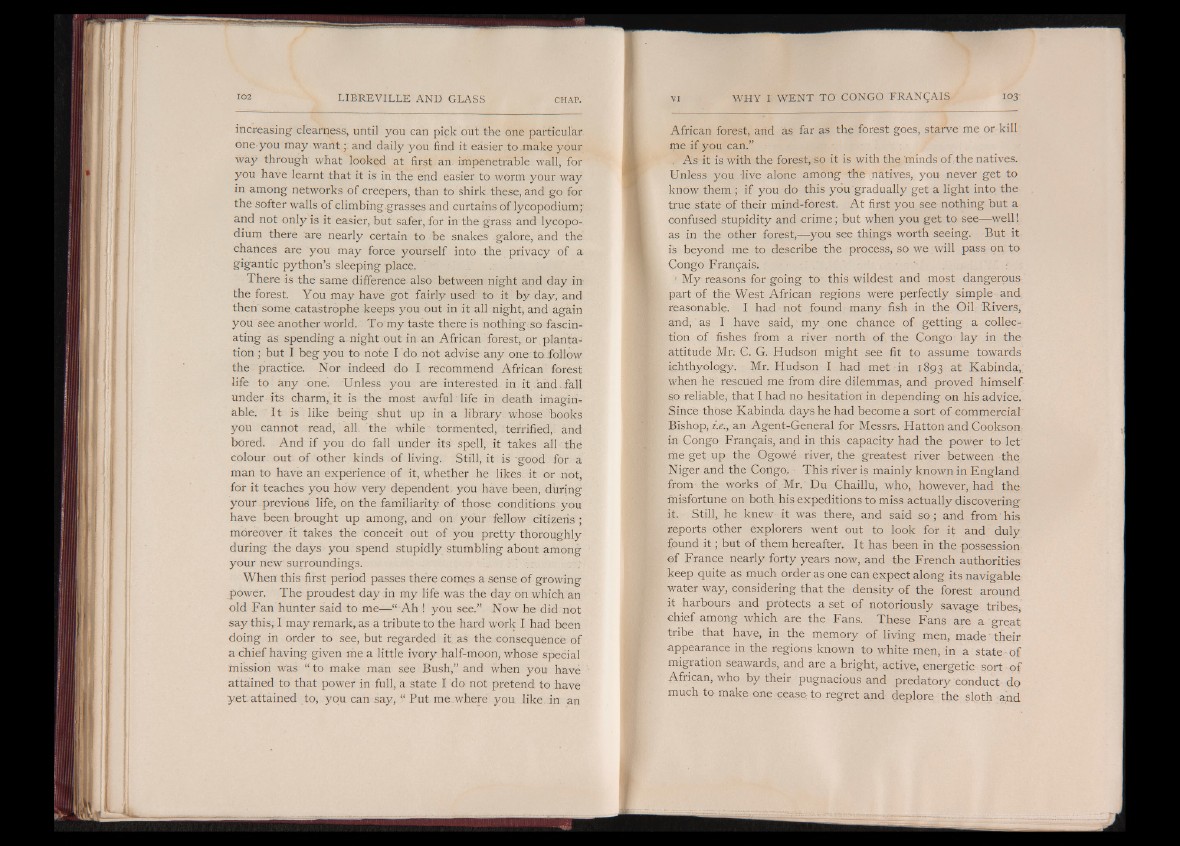
increasing clearness, until you can pick out the one particular
one-you may want; and daily you find it easier to make your
way through what looked at first an impenetrable wall, for
you have learnt that it is in the end easier to worm your way
in among networks of creepers, than to shirk these, and go for
the softer walls ofclimbing.grasses and curtains of lycopodium;
and not only is it easier, but safer, for in the grass and lycopodium
there are nearly certain to be snakes galore, and the
chances are you may force yourself into the privacy of a
gigantic python’s sleeping place.
There is the same difference also between night and day in
the forest. You may have got fairly used to it by day, and
then“ some catastrophe keeps you out in it all night, and again
you see another world. To my taste there is nothing so fascinating
as spending a: night out in an African forest, or plantation
; but I beg you to note I'do not advise any one to follow
the practice. Nor indeed do I recommend African forest
life to any one. Unless you are interested in it and.fall
under its charm, it is the most awful life in death imaginable.
It is like being shut up in a library whose books
you cannot read, all. the while tormented, terrified,’ and
bored. And if you do fall under its spell, it takes all the
colour out of other kinds of living. Still, it is'good for a
man to have an experience of it, whether he likes, it or not,
for it teaches you how very dependent, you have been, during
your previous life, on the familiarity of those conditions you
have been brought up among, and on your fellow citizens ;
moreover it takes the conceit out of you pretty thoroughly
during the days you spend stupidly stumbling about among
your new surroundings.
When this first period passes there comes a sense of growing
power. The proudest day in my life was the day on which an
old Fan hunter said to me— “ Ah ! you see.” Now he did not
say this, I may remark, as a tribute to the hard work I had been
doing in order to see, but regarded it as the consequence of
a chief having given me a little ivory half-moon, whose special
mission was “ to make man see Bush,” and when you have
attained to that power in full, a state I do not pretend to have
yet. attained to, you can say, “ Put me. where you like, in an
African forest, arid as. far as the forest goes, starve me or kill
me if you can.”
. As it is with the forest, so it is with the minds of the natives.
Unless you -Jive alone among the natives, you never get to
know them ; if you do this you gradually get a light into the
true state of their mind-forest. A t first you. see nothing but a
confused stupidity and crime; but when you get to see— well!
as in the other forest,— you see things worth seeing. But it
is beyond me to describe the process, so we will pass on to
Congo Français.
1 My reasons for going to this wildest and most dangerous
part of the West African regions were perfectly simple and
reasonable. I had not found many fish in the Oil Rivers,
and, as I have said, my one chance o f getting a collection
of fishes from a river north of the Congo lay in the
attitude Mr. Ç. G. Hudson might see fit to assume towards
ichthyology. Mr. Hudson I had met in 1893 at Kabinda,
when he rescued me from dire dilemmas, and proved himself
so reliable, that I had no hesitation in depending on his advice.
Since those Kabinda days he had become a sort of commercial
Bishop, i.e., an Agent-General for Messrs. Hatton and Cookson
in Congo Français, and in this capacity had the power to let
me get up the Ogowé river, the greatest river between the
Niger and the Congo. • This river is mainly known in England
from the works of, Mr. Du Ghaillu, who, however, had the
misfortune on both his expeditions to miss actually discovering
it. Still, he knew-it was there, and said so ; and from his
reports other explorers went out to look for it and duly
found it ; but of them hereafter. It has been in the possession
of France nearly forty years now, and the French authorities
keep quite as much order as one can expect along its navigable
water way, considering that the density of the forest around
it harbours and protects a set of notoriously savage tribes,
chief among which are the Fans. These Fans are a great
tribe that have, in the memory of living men, made their
appearance in the regions known to white men, in a state of
migration seawards, and are a bright, active, energetic sort o f
African, who by their pugnacious and predatory conduct do
much to make one cease to regret and deplore the sloth and